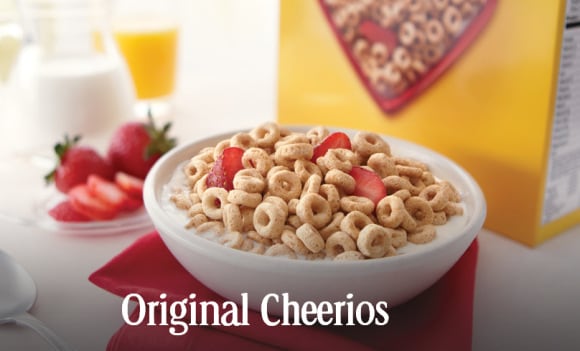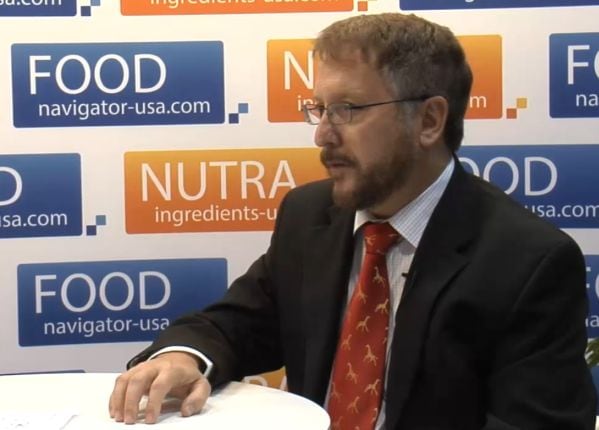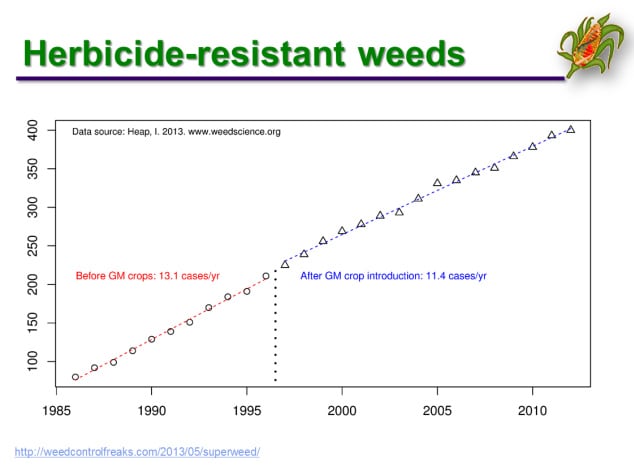Exhibitors at the show broadly sat in one of three camps:
- PRO: GM advocates, who believe that if the tide turns against biotech crops, it won’t be a victory for consumers.
- ANTI: Those passionately against GMOs (many of which are supporters of organic agriculture).
- AGNOSTIC: Those who are on the fence or in favor of GM crops, but see a PR opportunity in going non-GMO.
But even those in pro-GMO camp are pragmatists, Global ID* CEO Ken Ross told FoodNavigator-USA after one packed education session on achieving Non-GMO Project certification.
He added: “I wouldn't say the writing is on the wall for GM crops, but big brands are listening to the signals in the marketplace and their antennae are up. If they haven't made any announcements yet, they are all doing the spadework behind the scenes to see how feasible it would be [to switch to non-GMO ingredients in key brands]."
IRT: ‘Once we get to a tipping point the food companies will say we’re bleeding market share, we need to get rid of GMOs’
And while General Mills has repeatedly stressed that moving to non-GM ingredients across its entire portfolio would be “difficult, if not impossible”, its decision to test the water by removing GMOs from Original Cheerios sent out a clear signal to the market that this is now a mainstream issue, said Ross.

And while state and federal GMO labeling legislation were hot topics at the show, several delegates we spoke to said they are paying much more attention to market signals from brands such as Cheerios and influential retailers such as Whole Foods Market, to see which way the wind is blowing on this issue.
And this point has not lost been lost on anti-GMO activists such as Jeffrey Smith from the Institute for Responsible Technology, who told delegates at one session:
“Our focus should not just be about getting the votes [for GMO labeling]. We should be encouraging consumers to buy non-GMO. Once we get to a tipping point the food companies will say we’re bleeding market share, we need to get rid of GMOs.”
Consumers: Clueless about GMOs, but concerned nonetheless…
Consumers, meanwhile, are as clueless about what GMOs actually are as ever, according to Natural Marketing Institute managing partner Steve French.
If you ask them what they think, however, growing numbers claim to be “concerned” (click here), and this spreads to ‘conventional’ as well as natural and organic consumers, he said.

Politics, religion, and GMOs
But what about the science, which many GM advocates argue has been either lost completely in this debate, or wildly distorted by the anti-GMO camp?
As market researcher Packaged Facts recently remarked, the GM debate has “passed beyond being a reasonable discussion of scientific data into a public relations battle between two sides trying to control a narrative.”
Indeed, the only thing the two sides will probably both concede is that this whole topic has now become so emotionally charged that GMOs are fast joining politics and religion as topics best avoided in polite conversation.
So what are the facts?
The primary concerns of anti-GMO activists are that GM crops are over-hyped (they don’t deliver the promised benefits on yield, chemical use); untested (the safety regime to assess them is flawed); unnatural (splicing genes from another organism/bacterium/microbe/unrelated species to confer a beneficial characteristic is not ‘natural’); hidden from shoppers (they are not labeled on pack); and potentially damaging to the environment and human health.
Speaking at one education session at the show, Gary Hirshberg, chairman of organic dairy firm Stonyfield Farm and the Just Label It campaign alleged that:
“If you're having a baby in Iowa you shouldn't drink the water” … “Bt toxins have been found in the blood of pregnant women”… “there has been an explosion of weeds resistant to glyphosate” [Monsanto’s Roundup herbicide/weedkiller, which is sprayed on its herbicide resistant crops], and “there is direct correlation with autism [and increased use of glyphosate]”.
Crop scientist: Farmers are increasing the dose [of glyphosate herbicide] and mixing with other herbicides, thus losing the moral high ground to some degree
But how many of these assertions are backed by credible evidence?
It's a mixed bag, Dr Wayne Parrott, professor of Crop Science at the University of Georgia, told FoodNavigator-USA.
Some claims are just plain misleading, he alleged:
- GLYPHOSATE IN DRINKING WATER: Said Dr Parrott: “This would come from a recent study (click here) showing that 75% of rainwater samples had glyphosate it. What the speaker failed to mention was that many other agricultural chemicals are also present, and they are all many thousands of times lower than a cause for concern. For air, the inhalation LC50 for glyphosate is 4.43 mg/L. The maximum level found in these studies was 4.00 x 10-9 mg/L, ie, a billion times lower.”
- BT TOXINS IN THE BLOOD: “There was a study (click here) that claimed Bt was in the blood of pregnant women. We have no clue as to how it got published. Aside from eating raw corn, there are no sources where the Bt protein could have come from, other than organic produce. Meanwhile, the detection test used is known not to work on blood samples. And even if it did work, the levels of Bt protein found were below the level where the test works reliably.”
- GLYPHOSATE AND AUTISM: “They could have correlated autism to iPhone use or the amount spent on political campaigns. Correlation never proves cause and effect.”
However, Hirshberg does raise some legitimate concerns about herbicide resistance, although he fails to provide any context, said Dr Parrott:
- GLYPHOSATE RESISTANT ‘SUPER’ WEEDS: “It is a very large issue, particularly for us in the South. Right now farmers are increasing the dose [of glyphosate herbicide] and mixing with other herbicides, thus losing the moral high ground to some degree. But there have always been explosions of resistant weeds to the popular herbicide of the day, so this is an agriculture issue, not a GM issue. In fact I have it on good authority that the reason why glyphosate tolerant crops were adopted so quickly is that the super-weeds of the era were making farming close to impossible. But it does follow from this that both conventional and GM agriculture need to do a better management job.It boils down to a management issue. Farmers should rotate herbicides. The shutdown of the EU to additional GM approvals prevented other herbicide resistance options from being available. There is finally a whole new generation of resistant crops in the pipeline, with resistances to half a dozen herbicides on the way. Thus, farmers will be able to rotate properly in the near future.”
It is delusional to think that switching to natural pesticides will automatically be more sustainable.
Finally, if all the farmers currently growing GM crops switched back to growing 'conventional' (non-GMO) crops, what would happen?
Nothing good, according to Dr Parrott: “Today, growing Bt corn has roughly 40% less environmental damage than conventional corn, and Bt cotton has about 25% less damage, and conservation tillage would become far more difficult to implement. Essentially we would go back to where we were in 1990.”
Pound for pound, pesticides are not created equal

But what about going organic?
“If one reads the organic standards, the focus is on soil quality and the use of natural compounds,” said Dr Parrott.
“There is an emphasis on the use of management strategies to reduce the need for pest control, and nutrient recycling is encouraged. Having said that, the standards make no claim about energy efficiency, water efficiency, toxicity or other sustainability indicators.
“Unless organics are grown in a very dry climate, they use lots of non-synthetic pesticides. Some like to call them 'botanicals', but they still kill things. It is delusional to think that switching to natural pesticides will automatically be more sustainable. In some cases they will be, in others they will not be."
Finally, we should bear in mind that “pound for pound, pesticides are not created equal”, stressed Dr Parrott.
“A pound of salt will do a lot less damage than a pound of cyanide. The relative toxicity of an herbicide must be considered in order to get an accurate picture of environmental impact.”
Click HERE to read more about the GMO debate at Expo West.
*(Global ID is the parent company to GMO DNA testing firm Genetic-ID, the non-GMO Project's technical administrator Foodchain-ID, and the food safety and non-GMO certification group Cert-ID.)

